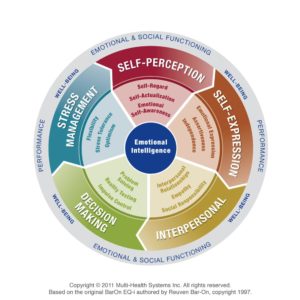An emotional intelligence test, also known as an emotional intelligence assessment, can have great value as an indicator – if not a predictor – of human performance and development potential. While not the sole indicator or predictor of these vital qualities, being able to measure your emotional and social skills offers powerful hints about the ways that you: tolerate stress, make decisions and build impactful relationships with your team.
- Perceive and express yourself
- Develop and maintain social relationships
- Cope with challenges and manage stress
- Make informed and grounded decisions
- Use emotional information in an effective and meaningful way
These five characteristics are not only the very definition of emotional intelligence, they also define who you are as a social being, as well as how, and if, you will succeed when dealing with others. Stated simply, your level of emotional intelligence will reflect your overall well-being and ability to succeed in life.
Ultimately, our goal when administering an emotional intelligence test is to gauge your effectiveness in self-awareness, self-expression, interpersonal skills, decision making, and stress management, all of which are necessary for healthy, high-performance, effective leaders – as well as happy and healthy people.
What is Emotional Quotient, or EQ?
Emotional Intelligence is a set of emotional and social skills that influence the way we perceive and express ourselves, develop and maintain social relationships, cope with challenges, and use emotional information in an effective and meaningful way.” [MHS Staff, Emotional Quotient Inventory 2.0 (EQ- 2.0) Technical Manual (Toronto: Multi-Health Systems Inc., 2011)]
In everyday language, it can be defined as “common sense” and Emotional Quotient (EQ) is a measure of emotional intelligence. According to the EQ-I 2.0 models, these include five buildings blocks: self-perception, self-expression, interpersonal development, decision making, stress management.
Know this: if you are an emotionally intelligent person, you recognize that your emotional side is involved in everything you do. Knowing that every action, decision, and judgement will be affected by your feelings, you will use your awareness to manage your emotions – rather than being managed by them.
The key idea for being an effective leader is to find a way to balance the components, not to worry about the overall score of an EQ test. You can’t have just high or low emotional intelligence – you need to go through the process of thorough assessment which is backed up by valid research and will determine how best to balance your EQ profile.
Unlike IQ, EQ changes during your lifetime and can be improved. There is data that can show what components of Emotional Intelligence are required in different leadership position, so by knowing your strengths and areas for improvement in EQ you can develop a plan on how to prepare for your future career growth or start strongly in your new role.
By learning the areas in which you are strongest, as well as those that need work, you can begin to enhance your EI and work toward more consistent responses to challenging situations and other people. This can have remarkable short- and long-term effects on how you live and work, plus how rewarding those aspects of your life will be.
Stay tuned to this blog for an exploration of the type of Emotional Intelligence Test we use.
